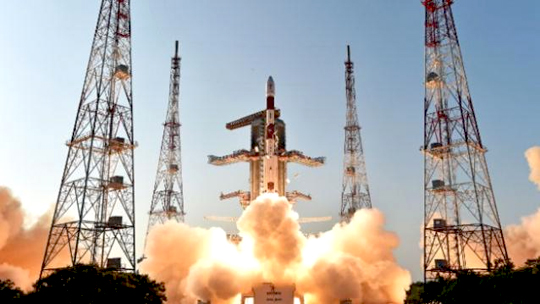Sriharikota, Apr 28: India today completed its landmark mission for a regional navigational system on par with US-based GPS with the successful launch of IRNSS-1G, the seventh and last in the constellation of satellites that make up the system.
When the IRNSS-1G becomes operational in about a month's time, the Indian Regional Navigation Satellite System (IRNSS) would offer services like terrestrial and marine navigation, disaster management, vehicle tracking and fleet management, navigation aide for hikers and travellers, visual and voice navigation for drivers.
Prime Minister Narendra Modi lauded the scientists and congratulated the people of the country on the achievement saying, "with this successful launch, we will determine our own paths powered by our technology".
"The world will know it as Navic.... The new technology will benefit our people, our fishermen. This is a great gift to people from scientists," Modi said.
ISRO's workhorse Polar Satellite Launch Vehicle (PSLV-C33) lifted off from the first launch pad at the Satish Dhawan Space Centre in this spaceport, about 110 kms from Chennai, at 12.50 PM and soared into clear skies.
The four-stage rocket injected IRNSS-1G into the intended orbit about 20 minutes after the lift-off as the PSLV marked yet another textbook launch and its 34th consecutive successful mission, reaffirming its dependability.
While IRNSS was already operational with four satellites, the remaining three were required to make it "more accurate and efficient", Indian Space Research Organisation (ISRO) said.
The IRNSS comprising the seven satellites will offer services with much 'better accuracy' and targeted position in navigation on par with the Global Positioning System of the United States.
ISRO had launched and operationalised other six satellites - IRNSS-1F on March 10, 2016, IRNSS-1E (January 20, 2016), IRNSS-1D (March 28, 2015), IRNSS-1C (October 16, 2014), IRNSS-1B (April 4, 2014) and IRNSS-1A on July 1, 2013.
According to ISRO officials, the total cost of all the seven satellites was Rs 1,420 crore.
For today's mission, ISRO used the PSLV-XL variant which has six solid strap-on motors to augment the thrust provided by the first stage, making the rocket powerful.
The XL variant was used during the launch of Mars Orbiter Mission, Chandrayaan-1, ASTROSAT besides the six earlier IRNSS satellites.
IRNSS-1G which has a 12-year mission life would become operational in about a month's time, marking the full-fledged functioning of the IRNSS.
With the operations of six satellites, so far, India demonstrated a targeted position of accuracy much better than 20 metres above earth and round-the-clock.






Comments
Add new comment